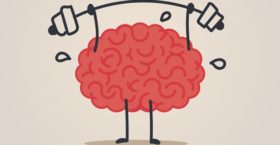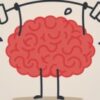To support brain health, we know many things that people should not do, such as smoke, drink alcohol heavily, use most recreational drugs, and engage in activities associated with frequent head trauma. But other than getting adequate sleep, there isn’t much that we know people should do to promote brain health, sharp cognition, and good mental health. Of course, we recommend eating a healthy, well-balanced diet, but very few individual foods or nutritional supplements have been proven to be good for the brain. The same goes for “brain teaser” activities and “cognitive skills training” programs. Contrary to logic, they haven’t been shown to produce sustained benefits.
However, time and again, one activity has been connected to robust improvements in brain health and prevention of brain diseases and mental health problems: exercise. And the encouraging results keep rolling in.
Regular aerobic exercise has been linked to reduced risk of developing dementia, such as Alzheimer’s disease. This type of exercise has also been repeatedly shown to prevent depression, and has even been proven to be an effective treatment for depressive and anxiety disorders, with effect sizes roughly equivalent to medications. These benefits have been consistently demonstrated in both human studies and in studies examining animal models of mental illness. More recently, non-aerobic weight traininghas also been definitively associated with positive effects on brain and mental health outcomes.
The ‘dose ‘ of exercise you need is not as high as you think — walking 20-30 minutes a day may be enough.
As if this news wasn’t good enough, the amount or “dose” of exercise that people need to promote brain health is not as high as you may think. Minimal amounts of exercise such as 20-30 minutes of walking or gardening a day – not even enough to lose weight – may be enough to boost cognitive functioning and lower the risk of mental health problems. So, it should be possible to fit into all but the very busiest schedules.
Exactly how exercise helps the brain is unclear, and there are many theories, multiple of which may be simultaneously true. Exercise may increase blood flow and oxygen supply to the brain. It may also increase the production and activity of “neurotrophic” (literally “brain feeding”) factors, such as brain-derived neurotrophic factor (BDNF). BDNF in critical brain areas such as a memory center called the hippocampus promotes brain health and mental resilience through stimulating the growth of new neurons and connections between them.
Exercise causes chemicals to be released from muscles and bones that may be essential to sustaining proper brain functioning. In addition, physical activity causes the release of several “feel good” substances, such as endorphins and endocannabinoids, which have been implicated in the feeling of general well-being and relaxation after a workout often referred to as a “runner’s high.”
Finally, exercise may benefit your brain for the same reasons that it is good for the rest of your body – it lowers blood pressure and inflammation levels and enhances proper blood flow and heart functioning.
Regardless of the exact reasons why it’s so healthy, we know that exercise is a relatively easy-to-do, inexpensive, and fun way to improve brain health and reduce the risk of mental illness and cognitive decline. So, do your brain a favor and grab those running shoes or that bicycle and head outside!
This article was first published by JustCareUSA.org. Reprinted by permission.






